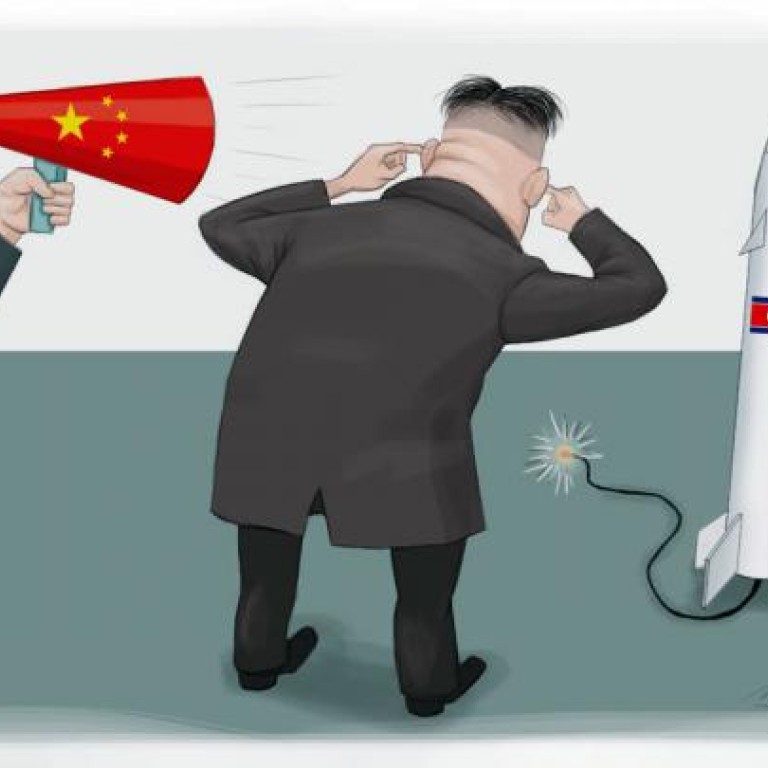
Beijing's new Politburo may deal more firmly with North Korea
Adam Cathcart, Nathan Beauchamp-Mustafaga and Roger Cavazos say China's new Politburo, which includes several specialists in relations with North Korea, may herald a change in policy
When Mao Zedong's legacy was finally decided upon after long debate in 1982, the Chinese Communist Party settled on the notion that the Great Helmsman was seven parts good, three parts bad, just as Mao had declared that if his own 10 fingers represented Stalin, seven were good. Now, the Politburo Standing Committee has shrunk to seven, what does it mean for North Korea? Where will those "fingers" point?
In understanding China's future North Korea policy, the makeup of the Politburo Standing Committee is the easiest bellwether, since it is the ultimate decision-making body on all crucial foreign policy decisions - few of which are more sensitive than those dealing with Pyongyang.
When Hu Jintao was at the helm, the Politburo Standing Committee lacked members with direct personal experience in North Korea. Despite being the supreme organ of national power, the standing committee was not particularly effective prodding North Korea towards economic reform.
Rising officials who hail from the northeastern provinces of Liaoning , Jilin and Heilongjiang understand the importance of perseverance to advance China's agenda of North Korean economic reform. These officials, represented by Zhang Dejiang and Li Keqiang , now on the Politburo Standing Committee, and Sun Zhengcai in the larger Politburo, spent their formative years in close proximity to North Korea, and benefited from their time in local governments with long-term cross-border interactions with North Korean counterparts. They appreciate that patience and constant pressure are key to promoting reform in Pyongyang. This new generation of leaders is ostensibly better informed on North Korean issues and this fact may lead to some policy nuance - if not policy changes - from China.
Zhang is a tried-and-true North Korea hand. Beyond the obvious connections to North Korea gained by graduating from Kim Il-sung University, where he was secretary of the party branch, and spending his early career in Jilin, his roles at each juncture of his career involved hands-on experience of North Korean issues.
Although the new leadership has made vague statements on North Korea (even after Pyongyang's latest, controversial satellite launch), Chinese academics close to the matter are a useful gauge of the temperature in Beijing policy circles. These academics include Zhang Liangui of the Central Party School, Zhu Feng of Peking University, and Lu Chao of the Liaoning Academy of Social Sciences, among others. These Chinese experts who are allowed and encouraged to comment about North Korea in mainland news media have not been entirely favourable. Zhang Liangui publicly raised questions about reconsidering China's policy towards Pyongyang just before North Korea's missile launch in April. Even more telling, Zhang, another Kim Il-sung University alumnus, conducted this public debate in English.
Much has been made of the "demotion" of the security position within the Politburo of Zhou Yongkang . But Zhou's successor, Meng Jianzhu , is hardly likely to be less hardline, and not having a seat on the Standing Committee will not deprive him of his immense budget for internal security .
Existing Sino-Korean military interactions regarding intelligence are unlikely to atrophy. In fact, making common cause against reformers appears to have strengthened some of these relationships.
Xi Jinping's public comments suggest that the military elements of the alliance will remain strong, but within limits. China will reluctantly tolerate space rockets even though these launches enrage regional rivals, and will likely tolerate small-arms and weapons development within limits; it's in China's interest to keep the Korean People's Army on its feet.
As an example, before North Korea's latest missile launch, the Chinese strengthened their rather oblique criticism of North Korea by issuing the statement: "North Korea has the right to the peaceful use of outer space," closely followed by these new words "but this right is restricted by the relevant UN Security Council resolutions." In language containing a hint of resentment, China states that it "hopes the relevant parties take actions conducive to peace and stability on the peninsula, act calmly and avoid escalating the situation".
Scholar Zhu Feng has also made post-launch comments in English- and Chinese-language media indicating that North Korea is causing Chinese soul-searching over whether and how to keep the relationship on track after Pyongyang publicly demonstrated its unwillingness to listen to its Chinese patrons.
China's willingness to acknowledge UN sanctions on North Korea indicates a rising exasperation and desire to nudge its leaders in a nuanced manner. China is reminding Pyongyang that it can enforce or ignore UN Security Council resolutions to North Korea's benefit or detriment.
Statements from scholarly North Korea hands allow China to send surrogate messages and maintain some distance.
Given China's preference for stability, we can expect all seven fingers to urge North Korea to help maintain the stable environment China needs to focus on reaching targets set at the 18th party congress. But it looks like some of those seven fingers are tired of being pricked by North Korea and are letting Pyongyang know that the "kid gloves only" treatment of the previous Politburo Standing Committee may be coming to an end.
